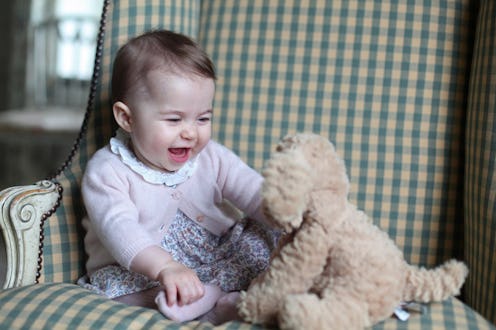Life
Why Do We Use Baby-Talk?
If your immediate reaction when faced with a baby is to coo complete nonsense in its face, know that you are not alone. (You're also not being hit by a wave of biological-clock-related insanity.) Baby-talk is one of the most common human behaviors; worldwide, right at this moment, mothers and grandmothers are looking down at their pudgy infant and talking to them in a language that, to an alien observer, sounds as if they should be locked up. But it's not just confined to babies; we also use baby-talk on our partners and, somewhat shockingly, on our pets. So what on earth is going on? Are we all afflicted with terminal cuteness overload?
I have done a lot of baby-talking in my life (my 11 cousins are, on average, 10 years younger than I am), and I can attest to how addictive it is. I also, however, feel like a complete idiot. The baby can't talk; why on earth am I so compelled to address it in this insane sing-song manner? And who decided we should talk to pets like that, too? Buster does not understand "who's got a cute face, yes you do," and he never will. It turns out that it's a matter of evolutionary biology, language development, human bonding, and neurochemistry. So no, you are not being compelled to talk mumbo-jumbo as part of some kind of bizarre conspiracy; it's your biology doing it for you.
So the next time you're given an infant and feel an uncontrollable urge to say things like "Tum-tum!" and "Who's a widdle snickerdoodle!", feel smug. You're helping it develop. Here are seven things to know about baby-talk.
1. Baby-Talk Is Designed To Help Kids Learn Language
The technical term for baby-talk is "infant-directed speech". It's got a few recognizable characteristics: it's dominated by shorter words, some of them nonsense or "nicknames" for longer words; it's emotionally charged and often repetitive; it's higher-pitched than normal speech, and uses a bigger range of high and low pitch; and often sing-song in tone. So what's it all in aid of?
Scientists believe that baby-talk is meant to attract a baby's attention and give it clues as to what the spoken words mean, helping it speed up its acquisition of language. Babies like listening to infant-directed speech far more than normal words, possibly because it sounds more interesting.
A study in 2014 found that talking to your kids in high-pitched tones with elongated vowels meant that they had three times as many words in their vocabulary by the time they reached the age of two as non-baby-talk infants. The pitch of baby-talk is designed to appeal to baby ears, and the practice is most effective when it happens one-on-one.
2. .. But We Actually Speak Less Clearly To Kids Than To Adults
One of the first real in-depth studies of baby-talk released its results in January 2015, and it discovered something kind of amazing. For ages, people had assumed that baby-talk was meant to make words clearer to babies, by emphasizing syllables and speaking slowly. But the study, which did huge in-depth analysis of Japanese mothers using baby-talk on their children, found that on average, the baby-talk was much less clear than their syllables when they spoke to other adults.
This is important because it shows baby-talk isn't actually about us hyper-articulating our words to make them easier to understand. The process of language-learning for babies might be more closely tied to the emotion and pitch of baby-talk than getting really crisp, clear-cut syllables spoken over their cot. Babies, it seems, pick up on the emotions of words very clearly in baby-talk; scientists played German and Italian baby-talk to American infants and found that they responded to positive or negative foreign infant speech just as they would in their own language.
And there's evidence that baby-talk helps adults learn new languages, too; a 1995 study found that Mandarin learners could learn words more easily when they were played tapes featuring baby-talk. Why aren't we talking in baby-talk more often?!
3. Depression Actually Makes Our Baby-Talk Less Effective
If you have postpartum depression, there's an even stronger reason to seek help than just your own health; it may be negatively impacting on your baby-talking capabilities, and your kid's ability to learn new words. A study from 2012 found that depressed new mothers had more monotonous baby-talk, with less pitch variation, and that their infants had difficulty learning as a result; it may even be linked, according to Parenting Science, to learning delays and speech problems in toddlers.
This may also be part of a feedback loop. Baby-talk actually gives us a dopamine hit, releasing feel-good chemicals in the brain. Depression's dampening of this particular feel-good high may contribute to less effort in making baby-talk at all.
4. It's Also Common Among Many Primates
Baby-talk has been recorded in many cultures worldwide, from Africa to South Asia, and it may even be a universal human behavior. (Which would make sense, considering how good it seems to be at teaching kids how to speak.) But humans aren't alone in baby-talking; primates do it too.
Gorillas have their own baby-talk "touch" language, according to studies of various Lowland Gorillas in 2011. When they communicate with gorilla infants, adults use a gestural language that involves far more touching and gentle physical interaction than they use amongst themselves. This sort of baby-focused communication has also been observed among bonobos and other primates. So we may have evolved to do this many millennia ago.
5. Fathers Do It Far Less Than Mothers Do
There's a reason why baby-talk is actually referred to, among the scientific community, as "motherese". It's been associated largely with the maternal parent of any child. And a study by the American Institute of Physics found that, even though we're now in an era where men increasingly take on a large share of parenting from the very beginning of their children's lives (and therefore have a big role in their speech development), they still aren't all that likely to drop into baby-talk and cooing. They're far more likely to talk to their kids like tiny adults.
The researchers don't necessarily think this is a bad thing, though. Fathers may be varying their speech in other ways to make it easier to understand, like slowing it down or emphasizing certain syllables; and there's certainly no evidence to suggest that being raised by a dude hampers your speech acquisition. There's more than one way to speak to a baby.
6. We Use It On Animals Because We See Them As Small Children (Sort Of)
Why the hell do we call our cats "pudden" and coo over puppies when they're small? It seems the same bonding drive that makes us care for infants — a visceral, evolution-driven reaction to small, fat, vulnerable humans — may also kick in when we see small, fat, vulnerable animals. A particular set of characteristics (big eyes, a rounded head, round cheeks, soft body) kicks off a "must protect and nurture" neurological reaction in humans, designed to make us want to care for babies rather than abandon them. Many animal-lovers feel their pets fit into those categories nicely. (The technical term for these characteristics is the kinderschema).
It's also tonal communication. Sing-song tonal words, as any animal owner knows, are a good way to communicate with pets; pets respond particularly strongly to vocal tone, and training means they associate it with feelings and experiences. This is partially why dog owners in particular are encouraged to give their pets vowel-heavy names, as it makes it easier to give them tonal variation and communicate different messages.
7. We Use It On Partners To Express Intimacy

If you hate those friends of yours who call each other ridiculous baby nicknames in public, relax: it means their relationship is strong (if nauseating). It turns out that baby-talk is embedded in the memories of many humans as an expression of security and love; after all, it's how our parents talked to us. Hence our tendency to use it on partners. It's one of the most intimate parts of human language.
Sex counselor Ian Kerner tells Bustle that baby talk in a relationship is also part of an individual language, formed as a private bond between partners. “When we rely on the common vocabulary, it feels just that — common,” Kerner says. “I think [then] you search for the private, secret vocabulary that exists just between us and our partner ... It's wonderful when our words can really correlate and synch up with our feelings.” We're allowing them access to our silliest, most vulnerable parts, and baby-talk is a linguistic symbol of complete comfort and bonding.
Yes, this means you can now call your girlfriend Pookie-Face with abandon.
Images: Giphy
